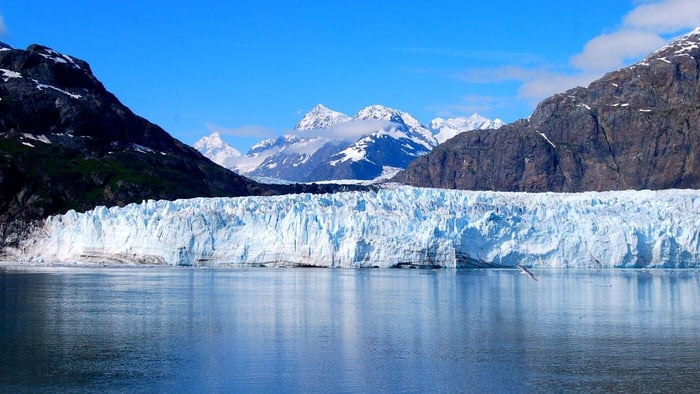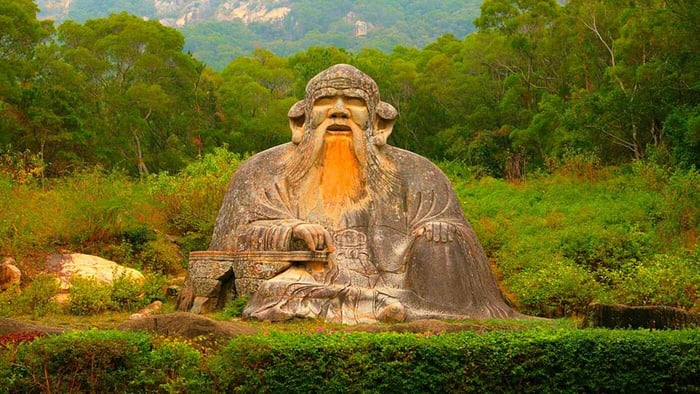
The FLOW of WU WEI and WATER: Embracing Effortless HARMONY
Most know the phrase Wu Wei, but do we live it? Discover the depth of Wu Wei, a philosophy of flexible action, not passive inaction. It's Wei more than go with the flow.
Wu Wei was one of many ancient variations of “go with the flow”. Like water, the idea called for people to embrace a state of nonaction. Such a simple characterization of a complicated concept has prompted many lost souls to embrace a pessimistic, apathetic outlook while claiming that they are merely listening to their ancestors’ words.
However, Lao Tzu (aka Laozi) did not intend for future generations to flippantly discard his words as a simple excuse. Rather, when reading the foundational Taoistic text called Tao Te Ching, it becomes clear that he was channeling an essence far more nuanced.
As seen in Chapter 48 ...
“Those who seek knowledge, Collect something every day. Those who seek the Way, Let go of something every day.”He does not sympathize with the youth clutching their chip bags (I say as I clutch my chip bag as I type under a CostCo blanket), but rather endorses the pursuit of academia, connection, and well-doing over the pursuit of a particular answer or unwavering path. Wu Wei is not the concept of no action and is instead the concept of flexible action. It is here that Wu Wei once more becomes inseparable from water.
A Little About The Tao (The Dao)
The Tao, or "the Way," is the natural order of the universe, an ever-present force that guides all things in harmony. Rather than a concept to be intellectually grasped, the Tao is something to be experienced—through flow, balance, and alignment with nature. Rooted in ancient Chinese philosophy, Taoism teaches that true wisdom comes from observing the rhythms of the world and embracing its effortless unfolding.
A core principle of Taoism is Wu Wei, or effortless action—allowing life to unfold naturally rather than forcing outcomes. This philosophy is deeply tied to yin and yang, the balance of opposing yet complementary forces. Darkness and light, stillness and movement, yielding and asserting—each exists in relation to the other, shaping the world in perfect equilibrium. By aligning with these cycles, one finds peace and purpose.
The Tao Te Ching, attributed to Lao Tzu, serves as a cornerstone of Taoist thought, offering poetic insights into living in harmony with the Tao. Unlike theistic traditions, Taoism does not center on worship but on understanding and embodying the Way. Its influence extends beyond spirituality, shaping Chinese culture, medicine, martial arts, and environmental philosophy. Even today, the wisdom of Taoism continues to inspire those seeking balance, simplicity, and a deeper connection to the natural world.
AquaCera Terra2 Handcrafted Cobalt Blue Stoneware Gravity Water Filter System With (2) CeraMetix Filters
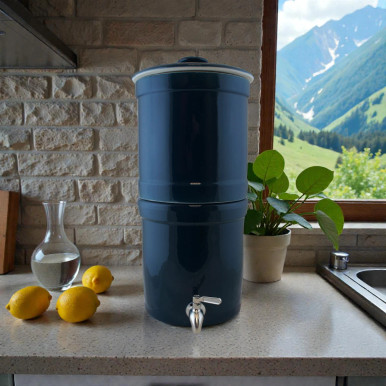
$349.95
Water as it should be. Every drop. When every drop you drink is pristine, life feels lighter, healthier, and more alive. And when it is...… read more
The Water-Like Nature Of Wu Wei
Water is persistent. An unwavering force that, while seemingly all-powerful, is capable of adjusting to its environment. The same material that has carved the Earth, as well as quenched the Universe’s most complicated creatures, still bends to the shape of a disposable red party cup. To be at peace in life,
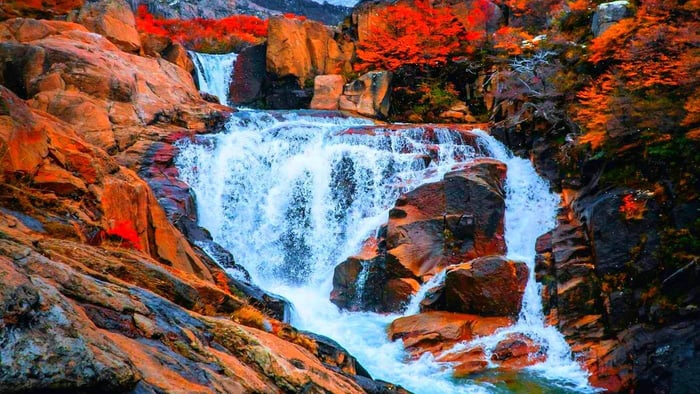
Wu Wei and water suggest that a person has to handle obstacles and others with humble attentiveness and a flexible spirit. These traits, while admirable, seem out of reach for those in the postmodern era where rigidity and self-serving tendencies appear to have taken hold. An era where a “growth mindset” is a skill, not a naturally assumed way of life. In an ever-advancing world, we have a unique opportunity to end the separation of romanticized Wu Wei and our day-to-day lives.
Top 5 Aspects Of Wu Wei
- Effortless Action (Non-Striving): Wu Wei is not laziness, but acting with minimal friction—doing only what is necessary, in the right way, at the right time. It involves "getting in the zone" where skills, focus, and action merge without the need for conscious, anxious striving.
- Letting Go of Control: This involves trusting the natural unfolding of events rather than trying to micromanage or force situations to fit a rigid desire. It requires relinquishing the need to command every detail, reducing stress and anxiety.
- Following Natural Flow: Living in harmony with the Tao (the Way) means aligning actions with the inherent, natural state of things. It is a form of "spontaneity" that lets life unfold rather than forcing a predetermined outcome.
- Adaptability: Like water, which navigates obstacles without force, practitioners adapt to circumstances. This flexibility allows one to flow around challenges rather than colliding with them, maintaining inner peace.
- Detachment from Outcomes: This aspect focuses on doing a task for its own sake rather than being emotionally invested in the result. This reduces the tension and anxiety that come from having rigid expectations for the future.
And so the question remains: How does one embrace Wu Wei? Committing to such a philosophy first requires a lack of expectations, meaning that you are not going into it with the idea that it will overhaul or fix your life. Surely, taking on such a mental exercise will likely bring about transformation, but envisioning one particular outcome defeats the purpose. “To go with the flow” is not to “go with the flow except in one certain direction, with one unchangeable goal”. If it were, we would all be stuck on our failures and would never move on to create new successes. Instead, approach the challenge with few assumptions, understanding that it is a concept key to exploring the world, not understanding it.
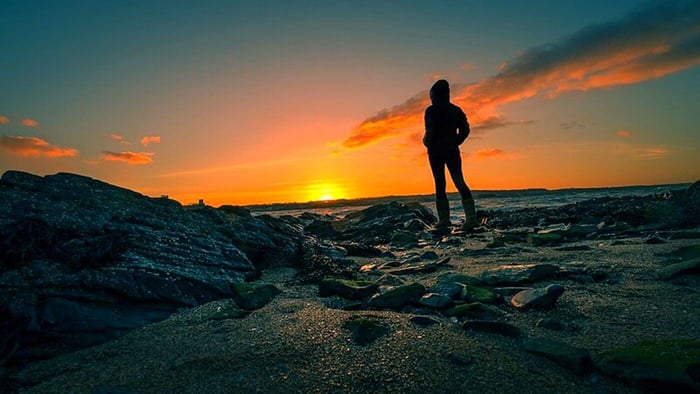
Once you have accepted the assumption-less nature of Wu Wei, implementing it into your life starts at whatever pace you desire. Beginning is simple: you attempt mindfulness in one singular situation. This will look different for everyone. You can ask yourself questions (How does your body react to this task, conversation, or environment? Does making a small change impact your reaction?) or perhaps you can attempt to go with your “gut.”
As an unwilling overthinker, I found it best to complete five focused breaths and then complete my tasks in whatever way felt natural to me. Taking the path of least resistance, just as water does. However, how I approach it may not be effective for everyone. If you are not aware of what is most conducive to a mindful environment for you, consider trying several trial attempts before landing on a couple of processes that work for you.
Wu Wei As A Path, Not A Destination
Once you have your process(es) down, Wu Wei is continued through repetition. It is not failing if you don’t welcome every task through the perspective of mindful flexibility. Wu Wei does not subtract points. Success is earned through the mere attempt of explorative openness and self-reflection.
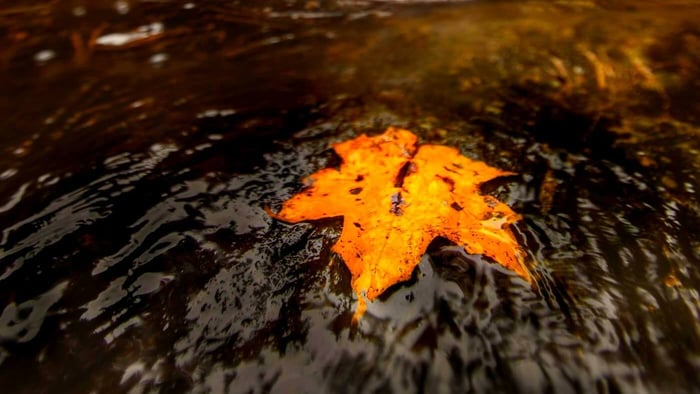
For those wanting to advance the usage of Wu Wei past this point may look towards incorporating it outside of our self-internalized worlds. As a 21st-century conception, Wu Wei embraces not only the balancing of oneself, but of the entire system. This, once again, is not the overhaul of any system, but rather allowing fluidity and honest reflections space within more constricted environments.
Wu Wei In Leadership: The Power Of Fluidity
Water-like leadership, or WLL, is one example of bringing the lessons of Wu Wei into a corporate environment. This approach to being in a manager position focuses on clarity, humility, and adaptability to the needs of the employees working under them. This is opposed to stricter working conditions that prioritize productivity over the prosperity of all individuals involved.
Laurent Auzoult, a professor of psychology at the University of Burgundy, took it upon himself to write an article on the WLL approach. His final paper, Wu Wei: A Contribution to the Water-like Leadership Style, covers numerous studies on the subject, and one of his conclusions is as follows:
“In terms of consequences, it was observed (Study 3) that SNA,” [strategic non-agency, correlated heavily with Wu Wei], “was associated with positive health states, performance and optimal experience states (e.g. flow) at work. The third dimension, conformity with the order of things, also seems able to inhibit states of psychological distress at work. Overall, the results of the three studies validate the measurement of SNA and highlight the utility of developing work leadership anchored in Daoist principles.”A New Way To "Go With The Flow"
It is clear that whether Wu Wei is incorporated on the individual or large scale, even after a millennia, it still proves as a key to unlocking further happiness and productivity levels. Next time your boss, partner, or friend snarkily tells you to just “go with the flow” tell them that you already do. And maybe send them this article if they stare at you utterly confused, or leave them wordless.
Watch this video below to explore how embracing Wu Wei can bring clarity, ease, and harmony to your life. It’s a that holds a key to true peace. In a world that pushes us to hustle, strive, and control, Wu Wei teaches the art of effortless action, a serene acceptance of life’s flow. You are welcome.




